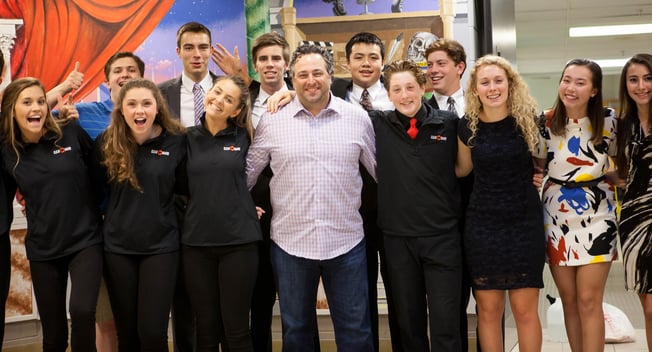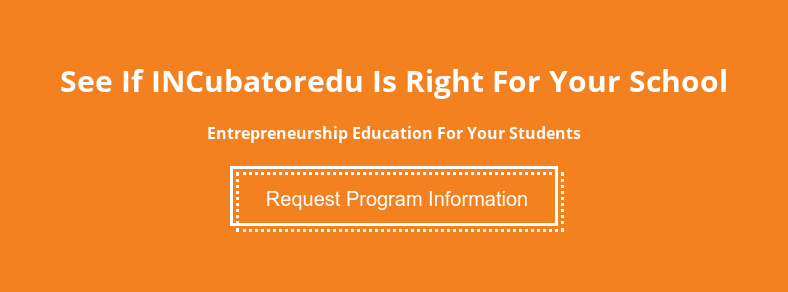INCubatoredu isn’t your average high school class. Instead of assessing students’ knowledge and abilities against a standardized testing process, we encourage students to fail. Yep, you read that right. We invite INCubatoredu students to fail, learn from failure, reassess, and reboot—because that’s what’s expected in youth entrepreneurship.
Skills Students Need - the Skills of a Youth Entrepreneur
Armed with an entrepreneurial mindset, content skills and knowledge, INCubatoredu students graduate high school poised to build a business and take on the real world. But it’s not just the students who learn in INCubatoredu. Instead of lecturing to students and asking them to regurgitate information, INCubatoredu teachers are on a journey of their own. These teachers are comfortable not having all the answers. Instead, they embrace the entrepreneurial mindset alongside their students.
One such teacher is Hagop Soulakian, "Hags" an INCubatoredu Master Teacher at Barrington High School in Barrington, Illinois. Through INCubatoredu, Hags gives students a platform to develop the skills they need to succeed post-graduation. As he kicks off his ninth year teaching youth entrepreneurs in INCubatoredu and ACCELeratoredu (and coaching Broncos Baseball!), we caught up with him so he could share his story about how INCubatoredu prepares today’s students to creatively solve problems, prepare for modern business challenges, and confidently compete and succeed in a rapidly changing world.
“We prepare kids to take tests and take AP exams to build their resume, and some of that is OK … but they won’t be ready without the soft skills. We have to teach students to overcome some of the failures they will face.” –Hagop ‘Hags’ Soulakian, Master Teacher, INCubatoredu, Barrington High School
Q&A with INCubatoredu Master Teacher Hagop Soulakian
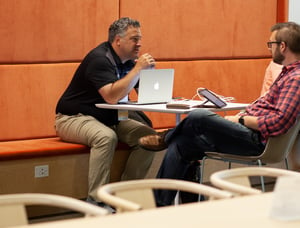
What top skills do you find most valuable for today’s high schoolers?
Communication and presentation skills, confidence, time management, critical thinking, self-driven learning, and learning to fail and recover.
In your opinion, how important are hard skills, like coding, and soft skills, like presenting?
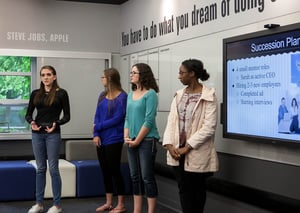 I think both are important, to a degree. In this world, I believe you need to be able to create something or sell something. Build an excel spreadsheet, create an app, develop a marketing plan … be able to create something on your own that’s valued. That’s important.
I think both are important, to a degree. In this world, I believe you need to be able to create something or sell something. Build an excel spreadsheet, create an app, develop a marketing plan … be able to create something on your own that’s valued. That’s important.
Now, selling, that’s all about persuasion, communication, and presenting and working with people. And these soft skills can really elevate your game -- I hear it all the time from my former students. These are the skills we practice and hone in the INCubatoredu classroom, and some students are really stretched into new territory. And that’s good.
How does proficiency in these skills benefit students in the long run?
These skills separate students from their peers. I see it, and I’ve heard this from my graduates. If you have the drive, and know-how to get things done on your own and on time—if you’re able to solve problems on the fly —you’ll stand out. And in the workforce, you need to stand out. This can help both in your professional life and in your personal life. And these things extend way beyond school, professionally and personally.
I personally didn’t learn these skills in school. In my first career, before I was an educator, I worked at the Merc (Chicago’s Mercantile Exchange). There, you had to communicate and solve problems on the fly, and millions of dollars were at stake. So the sooner that students can understand the importance of these soft skills, the better they’ll be in any career path...
Do you feel students have or lack these skills, in general, today?
They lack. And I see this with my own kids. Kids don’t even use phones to talk to anyone today — so, absolutely, students don’t have the basic skills.
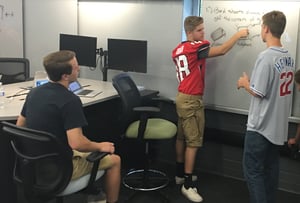 We prepare kids to take tests and take AP exams to build their resume, and some of that is OK … but they won’t be ready without the soft skills. We have to teach students to overcome some of the failures they will face. 99% of their day, failure is “bad,” but in the INCubatoredu class, you can fail and learn to get better, and understand what you need to do to change.
We prepare kids to take tests and take AP exams to build their resume, and some of that is OK … but they won’t be ready without the soft skills. We have to teach students to overcome some of the failures they will face. 99% of their day, failure is “bad,” but in the INCubatoredu class, you can fail and learn to get better, and understand what you need to do to change.
This class helps with that mindset shift. In INCubatoredu, failure is defined as trying something and not getting your desired result and making changes to get better results. I find that students really appreciate honesty; they tell me so. They want constructive feedback when they don’t do something well, and maybe we don’t do enough of that at home as parents, so there’s even more pressure and the necessity for them to pick up these skills at school — the practice of trying something, totally getting it wrong, learning, and moving on. They need this to be healthy and growing in the area of SEL.
Why do you think a lot of students lack or have yet to develop these skills?
We aren’t prioritizing these skills as educators as much as we should, in my opinion. Standardized testing and traditional testing drives how we’re teaching. That’s how it is now, and I get it.... but kids don’t necessarily have enough time to think beyond memorization and the confines of a particular assignment these days.
When I was young, if you wanted to play baseball, and had only seven kids, you’d figure it out. But now, kids are looking for answers instead of problem-solving on their own. “Hey coach, how do we solve this?” they ask. We as educators should give them opportunities to improve and build those skills. I see that as our job — to provide opportunities to experience things (wins and losses), work to figure things out, reflect, adjust, and grow.
What are some strategies for students to develop these skills?
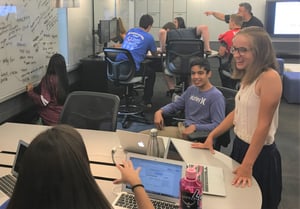 Students need to get out there and try. Present to a group, share their ideas, take a class they normally wouldn’t — try things that are scary. High school is the time to do that — to lean in, try, and practice these skills. The INCubatoredu program allows this.
Students need to get out there and try. Present to a group, share their ideas, take a class they normally wouldn’t — try things that are scary. High school is the time to do that — to lean in, try, and practice these skills. The INCubatoredu program allows this.
Answers aren’t pre-determined, and that’s different for students. It really drives an entrepreneurial mindset that will benefit them no matter what. Learning entrepreneurship isn’t just about learning how to start a business and how to become a youth entrepreneur, even though they most certainly do. It’s the backdrop to building all these great skills. Teachers are there to guide and support the student journey. It’s a very different experience from other classes, and it really turns things upside down for kids … in a good way.
“Students need to get out there and try. Present to a group, share their ideas, take a class they normally wouldn’t — try things that are scary.” –Hagop ‘Hags’ Soulakian, Master Teacher, INCubatoredu, Barrington High School
Hags, finally, what advice would you give teachers to help foster an entrepreneurial mindset in students?
The best teacher in life is experience. That was true for me. And unfortunately, there’s so much structure now for these students, they don’t experience as much independently.
1. Help students find their passion.Find ways to give students the chance to experience new things, work to solve problems and find their own answers, and—most importantly—find something to be passionate about. That’s where things get powerful. I share with my students: “I've learned that people will forget what you said, people will forget what you did, but people will never forget how you made them feel.” (Maya Angelou) This is something students can embrace. It helps ignite passion around the ideas they’re working on.
The INCubatoredu experience can change students. I have students come back to me when they’re out in the workforce or in college and say, “Aha, now I get what you were doing here,” and “What I took away from this class really helped me.”
2. Bring industry into the classroom.
Have students talk with professionals so they really know what it takes out there in the real world. I hear from students that once they’re out, they really didn’t know what to expect - that doesn’t need to be the case.
3. Adopt an entrepreneurial mindset as an educator.
Be vulnerable to learning new things, be open about when you don’t have answers, walk the walk, and don’t just talk the talk.
Teaching Entrepreneurship Makes A Difference in Skills for Students
Hags shares the profound impact fostering an entrepreneurial mindset in students (and teachers) has in education, in business, and in our communities.
From developing both hard and soft skills, encouraging students to learn from failure, and igniting inner passion, teaching entrepreneurship in high school makes a difference.
